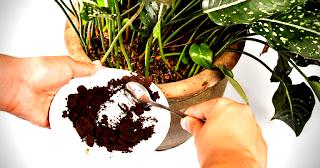Composting with coffee grounds - Used coffee grounds for the garden
Whether you're making your daily coffee or you've noticed that your local coffee shop is starting to deflate used coffee bags, you may be wondering how to compost with coffee grounds. Is coffee grounds a good idea as a fertilizer? How does coffee grounds used for gardens help or harm? Read on to learn more about coffee grounds and gardening.
Composting Coffee Grounds Composting
with coffee is a great way to use up something that would otherwise take up space in the landfill. Composting coffee grounds helps add nitrogen to your compost pile.
Composting coffee grounds is as easy as throwing used coffee grounds into your compost pile. Used coffee filters can also be composted.
If you are adding used coffee grounds to your compost pile, keep in mind that they are considered green compost material and will need to be balanced by adding some brown compost material.
Coffee Ground as Fertilizer
Coffee grounds used for gardening do not end with compost. Many people prefer to plant coffee grounds directly into the soil and use it as a fertilizer. The thing to note is that while coffee grounds will add nitrogen to your compost, it will not add nitrogen to your soil immediately.
The benefit of using coffee grounds as a fertilizer is that it adds organic matter to the soil, improving drainage, water retention, and soil aeration. The coffee grounds used will also aid in the development of beneficial microorganisms for plant growth and attract worms.
Many people think that ground coffee lowers the pH of the soil (or raises the acid level) , which is good for acid-loving plants. This only applies to unwashed coffee grounds. Fresh coffee grounds are acidic. Used coffee grounds are neutral. If you rinse used coffee grounds, they will have a neutral pH close to 6.5 and will not affect the acid levels of the soil.
To use coffee grounds as fertilizer, work the grounds into the soil around your plants. Leftover diluted coffee also works this way.
Other Uses of Used Coffee Fields in Gardens
Coffee grounds can also be used for other things in your garden.
1 Many gardeners like to use used coffee grounds as mulch for their plants.
2 Other uses of coffee grounds include using it to keep slugs and snails away from plants. The theory is that the caffeine in coffee grounds adversely affects these pests and therefore they avoid the soil where the coffee grounds are found.
3 Some people also claim that ground coffee grounds are cat repellent and will prevent cats from using your flower and vegetable beds as litter boxes.
4You can also use coffee grounds as worm bait if you compost with a worm bin. Worms are very fond of coffee grounds.
Using Fresh Coffee Ground
We get a lot of questions about using fresh coffee grounds in the garden. Although it is not always recommended, it is not a problem in some cases.
1 For example, you can sprinkle fresh coffee grounds around acid-loving plants such as azaleas, hydrangeas, blueberries, and lilies. Many vegetables like slightly acidic soil, but tomatoes typically don't respond well to the addition of coffee grounds. Root crops such as radishes and carrots, on the other hand, respond positively, especially when mixed with the soil at planting.
2 The use of fresh coffee grounds is also thought to suppress weeds, which have some allelopathic properties that negatively affect tomato plants. Another reason to use it with caution. However, some fungal pathogens can also be suppressed.
3Sprinkling dry, fresh ground around the plants (and on top of the soil) helps deter some pests, as with used coffee beans. While it doesn't completely eliminate them, it helps keep cats, rabbits and slugs away and minimizes their damage in the garden. As mentioned earlier, this is thought to be due to its caffeine content.
4 Instead of the caffeine found in fresh, unbrewed coffee grounds, which can have a negative effect on the plants, you can use decaffeinated coffee to avoid any problems or simply apply the fresh ground to a minimum.
Coffee grounds and gardening go together naturally. Whether you're composting with coffee grounds or using garden-ground coffee grounds, you'll find that coffee can get me into your garden as well as you.



